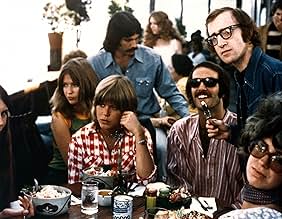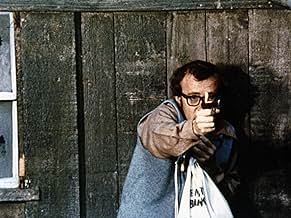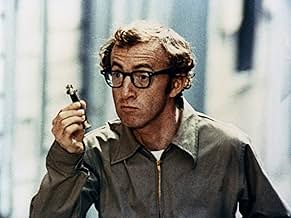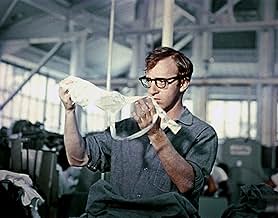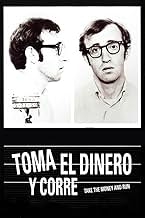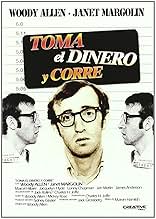IMDb RATING
7.2/10
32K
YOUR RATING
The life and times of inept bank robber Virgil Starkwell.The life and times of inept bank robber Virgil Starkwell.The life and times of inept bank robber Virgil Starkwell.
- Awards
- 3 nominations total
Dan Frazer
- Julius Epstein - The Psychiatrist
- (as Don Frazier)
Jackson Beck
- The Narrator
- (voice)
- Director
- Writers
- All cast & crew
- Production, box office & more at IMDbPro
Featured reviews
Virgil Starkwell was a product of his environment. Born into a poor family living in a rough community, Virgil soon finds companionship with a rough crowd and gets sucked into a life of petty crime from a very young age. An interest in the cello is not enough to set him straight and his acts continue into adulthood. Love, a powerful motivator, proves to be his undoing as he tries to rob a bank to fund his relationship.
We all talk about Allen's "earlier, funnier" films (even he does) but this probably doesn't extend the whole way to the very start of his film career because this, his second film, isn't up to the standard of Love & Death, Annie Hall and the like. The film is a mockumentary looking at the life and career of failing small-time criminal Virgil Starkwell and as such there is a basic narrative to provide some structure. Supposedly tightened up significantly in the editing room, the film is still pretty baggy at times and doesn't really have the material to carry it to even 85 minutes. However what the film does do well is produce plenty of imaginative moments that made me laugh out of nothing. I think of the scene where Virgil hires a car to run his blackmailer down, the spelling errors on the notes and others that are imaginative twists on what you expect and funnier for it. The one liners (and dialogue generally) is not as strong as Allen fans would hope for because the humour tends towards the sight gag.
This isn't a criticism because the sight gags are mostly good but the problem is one of consistency. I wasn't laughing anywhere enough for this to be a memorable comedy and there were quite a few lulls. These came particularly where the film had a section of narrative or dialogue rather than fast visual snippets under the narrator it is the latter that are the strongest parts of the film but they can't come quick enough and there isn't enough to support it in-between. Allen makes a good lead of course and I found him to be very good at delivering the visual comedy. Margolin is a bit too stiff; not good enough at the comedy or the dramatic stuff. The rest of the support cast does what they are required to do but the film does belong to Allen and his script. Credit should go to editor Rosenblum for making it as tight as possible and keeping the visual gags flowing as best as he can while limiting the weaker dialogue bits.
Overall then an amusing film that will appeal mostly to Woody Allen films. There are plenty of imaginative comedy moments but it is not as consistent as it needed to be to consider it on the same level as Allen's finest films (that would follow this in the 1970's in my opinion).
We all talk about Allen's "earlier, funnier" films (even he does) but this probably doesn't extend the whole way to the very start of his film career because this, his second film, isn't up to the standard of Love & Death, Annie Hall and the like. The film is a mockumentary looking at the life and career of failing small-time criminal Virgil Starkwell and as such there is a basic narrative to provide some structure. Supposedly tightened up significantly in the editing room, the film is still pretty baggy at times and doesn't really have the material to carry it to even 85 minutes. However what the film does do well is produce plenty of imaginative moments that made me laugh out of nothing. I think of the scene where Virgil hires a car to run his blackmailer down, the spelling errors on the notes and others that are imaginative twists on what you expect and funnier for it. The one liners (and dialogue generally) is not as strong as Allen fans would hope for because the humour tends towards the sight gag.
This isn't a criticism because the sight gags are mostly good but the problem is one of consistency. I wasn't laughing anywhere enough for this to be a memorable comedy and there were quite a few lulls. These came particularly where the film had a section of narrative or dialogue rather than fast visual snippets under the narrator it is the latter that are the strongest parts of the film but they can't come quick enough and there isn't enough to support it in-between. Allen makes a good lead of course and I found him to be very good at delivering the visual comedy. Margolin is a bit too stiff; not good enough at the comedy or the dramatic stuff. The rest of the support cast does what they are required to do but the film does belong to Allen and his script. Credit should go to editor Rosenblum for making it as tight as possible and keeping the visual gags flowing as best as he can while limiting the weaker dialogue bits.
Overall then an amusing film that will appeal mostly to Woody Allen films. There are plenty of imaginative comedy moments but it is not as consistent as it needed to be to consider it on the same level as Allen's finest films (that would follow this in the 1970's in my opinion).
Take the Money and Run (1969) was Woody Allen's motion picture debut (sans 'Tiger Lily). The film follows the life of a criminal loser, shot in a faux documentary style. Allen used the most out of his small budget and made an amusing film. This was the beginning of his slapstick/farce phase that would last until the early 70's. An interesting start for one of America's most unique film-makers of that era. The script by Mickey Rose and Woody Allen is deeply engraved with screwball humor from their childhood icons such as the Marx Brothers and Charles Chaplin. This film showed the promise of a brilliant director who would become a major player in Hollywood in the years to come. Highly recommended.
A.
A.
Very early Woody Allen winner has the all-time lovable loser trying to make ends meet with girlfriend and future wife Janet Margolin. Allen, obviously pretty unskilled in most everything, decides that he can do just what the title of the film says and achieve true happiness with his one true love. Documentary-styled footage makes the picture unfold in a quietly uproarious way as Allen uses corny techniques used by most news organizations to tell a story that would have looked very odd without his insight being involved. Allen's films only work because he makes them work usually and that is definitely the case with "Take the Money and Run". Once again he shows unlimited potential and would use this movie, more than any other, as a spring-board for much future success in the 1970s, 1980s and beyond. 4 stars out of 5.
Take the Money and Run ranked rather high on the AFI's list of the 100 Funniest movies, which surprised me. Although it's got some hilarious bits of comedy (the bank robbery, of course, is the funniest bit), the humor seems a bit dated, on par with What's New Pussycat or Casino Royale as opposed to Bananas and Sleeper (his two early comedy classics, in my opinion). Janet Margolin (RIP) was a talented actress, but I didn't find her particularly funny in this movie. She was better in a brief role as one of Woody's high-strung ex-wives in Annie Hall. Louise Lasser and Diane Keaton were worthier (and funnier) replacements. A good bet for rainy day laughs, but not one of the funniest movies of all time.
"Take the Money and Run" is an absolutely hilarious Woody Allen film, done in a quasi-documentary style, about a career criminal, Virgil Starkwell, who has a very unsuccessful career. His prison breaks don't go as planned, his robberies are a disaster and usually coincide with someone else's robbery of the same place, and his planning of a job would be fine if only he weren't talking to an associate in a restaurant while the police are in the booth behind him. One nice perk of failure: while attempting to rob a young woman's purse, he falls in love with her (Janet Margolin). Virgil does admit at one point thinking of foregoing robbery and taking up a career in singing. He doesn't mention the cello, which gave him his start in music - and crime.
This is one of those laugh out loud even when you're alone movies of which there are all too few. But this is one. Over a tough, FBI-type narration, we watch Virgil's futile attempts at making money through crime, see his parents (disguised) interviewed, as well as his wife and the various police and investigators he meets along the way.
It's amazing to look at this film and then look at "Match Point" done 35 years later and see the evolution of this brilliant man. Woody Allen is capable of rock-solid comedy as well as provocative movie-making. Although he's had a few blips along the way, one wonders what he'll think of next.
This is one of those laugh out loud even when you're alone movies of which there are all too few. But this is one. Over a tough, FBI-type narration, we watch Virgil's futile attempts at making money through crime, see his parents (disguised) interviewed, as well as his wife and the various police and investigators he meets along the way.
It's amazing to look at this film and then look at "Match Point" done 35 years later and see the evolution of this brilliant man. Woody Allen is capable of rock-solid comedy as well as provocative movie-making. Although he's had a few blips along the way, one wonders what he'll think of next.
Did you know
- TriviaThe first widely-released "mockumentary".
- GoofsAs the chain gang escapes, they climb the same embankment twice.
- ConnectionsFeatured in The Dick Cavett Show: Woody Allen (1971)
- How long is Take the Money and Run?Powered by Alexa
Details
Box office
- Budget
- $1,500,000 (estimated)
- Runtime
- 1h 25m(85 min)
- Sound mix
- Aspect ratio
- 1.85 : 1
Contribute to this page
Suggest an edit or add missing content



